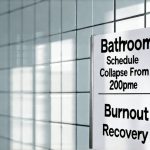Jet lag is a ubiquitous companion for anyone who frequently crosses time zones, but its impact often extends beyond just sleepiness and disorientation. It can subtly – and sometimes not so subtly – dismantle established routines, and one of the first areas to crumble is surprisingly often our bathroom routine. What seems like a simple set of daily habits—brushing teeth, washing face, showering—becomes a monumental task when your body clock is screaming for a different time. This isn’t merely about laziness or lack of willpower; it’s a physiological response to disruption, impacting cognitive function, energy levels, and even motivation. Understanding why this happens is the first step toward mitigating its effects and regaining some semblance of normalcy during recovery.
The bathroom routine, seemingly insignificant, actually represents a foundational element of self-care and mental preparation for the day (or night). It’s often one of the initial actions we take to signal to ourselves that we are awake, alert, and ready to function. When jet lag throws off our circadian rhythm, it simultaneously affects these cognitive processes and drains physical energy. Suddenly, even basic hygiene tasks feel overwhelming. The familiar comfort of a routine is replaced by a sense of disconnectedness and fatigue, making the simple act of getting ready feel like an insurmountable challenge. This breakdown isn’t just about personal grooming; it’s indicative of broader disruption to self-regulation and can significantly impact overall well-being during travel and recovery.
The Neurological Roots of Bathroom Routine Collapse
The connection between jet lag and bathroom routine collapse is deeply rooted in neurological changes. Crossing time zones forces your body to rapidly adjust to a new light/dark cycle, which directly impacts the suprachiasmatic nucleus (SCN) – often referred to as the “master clock” located in the hypothalamus. This internal clock regulates numerous bodily functions, including hormone release, sleep-wake cycles, and even cognitive performance. When disrupted, the SCN struggles to synchronize with the new environment, leading to a cascade of effects that impact motivation and executive function.
Specifically, jet lag can cause a temporary decrease in dopamine levels – a neurotransmitter associated with reward and motivation. This reduction explains why tasks that usually feel effortless (like brushing teeth) suddenly seem arduous and unappealing. Simultaneously, cognitive fatigue sets in. Decision-making abilities are impaired, making it harder to initiate even simple actions. The brain prioritizes survival mechanisms—restoring internal balance—over routine maintenance. It’s not about being lazy; it’s about a biologically driven shift in priorities.
Furthermore, the prefrontal cortex – responsible for planning and organization – is particularly vulnerable during jet lag. This area requires significant energy to function effectively, and when your body is already depleted from travel and circadian misalignment, its capacity diminishes. This explains why sticking to any kind of schedule, including a bathroom routine, becomes exceptionally difficult. The brain simply lacks the resources to consistently initiate and maintain these habits. If you find this happening regularly after travel, consider looking into digestive shifts triggered by jet lag as well.
Reclaiming Your Routine: Gradual Steps & Micro-Habits
The key to rebuilding your bathroom routine during jet lag recovery isn’t about forcing yourself into rigid adherence; it’s about embracing a gradual approach centered around micro-habits. These are incredibly small, manageable actions that require minimal effort and cognitive load. Trying to replicate your pre-travel routine immediately is likely to fail, leading to further frustration. Instead, focus on rebuilding one tiny step at a time.
- Start with one essential task: Choose the single most important aspect of your bathroom routine – perhaps brushing your teeth before bed or splashing water on your face in the morning. Commit to doing only that, even if it’s all you accomplish.
- Time-block, but be flexible: Schedule a very short time window for your routine (e.g., 5 minutes) and aim to complete the chosen task within that timeframe. If you can do more, great; if not, don’t beat yourself up about it. Flexibility is crucial.
- Reduce friction: Make it as easy as possible to engage in the habit. Place your toothbrush and toothpaste prominently on the counter, lay out your face wash, or prepare a shower bag with essential toiletries beforehand. Minimize any obstacles that could discourage you.
These micro-habits serve as building blocks for larger routines. As your body adjusts and energy levels improve, you can incrementally add more steps. The focus is on consistency over perfection, and celebrating small wins along the way. Remember that self-compassion is essential during this process; jet lag is a challenging experience, and setbacks are inevitable. A bathroom schedule collapse can also look similar to jetlag related routine loss.
The Role of Environmental Cues & Associations
Our brains are heavily influenced by environmental cues and learned associations. These can be harnessed to help rebuild your bathroom routine during jet lag recovery. Think about the environment where you normally perform these tasks – the lighting, sounds, even the smells. Recreate some of those elements in your new location to trigger positive associations and encourage engagement.
For example:
– Play music that you typically listen to while getting ready.
– Use similar scents (e.g., a specific soap or lotion).
– Ensure adequate lighting – darkness can exacerbate fatigue and reduce motivation.
Furthermore, linking your bathroom routine to other established habits can be incredibly effective. If you always drink coffee after brushing your teeth, do that even when jet-lagged. The existing habit serves as an anchor for the new one. This leverages the power of habit stacking – building on existing routines rather than creating entirely new ones from scratch.
Prioritizing Rest & Hydration: Fueling Routine Recovery
While focusing on micro-habits and environmental cues is helpful, it’s crucial to remember that bathroom routine recovery is inextricably linked to overall rest and hydration. Jet lag severely impacts sleep quality, leading to chronic fatigue. Trying to force a routine when you are profoundly exhausted will only lead to frustration.
Prioritizing sleep – even if it means taking short naps during the day – is essential for restoring cognitive function and energy levels. Aim for consistent sleep-wake times, even on weekends, to help regulate your circadian rhythm. Similarly, dehydration can exacerbate fatigue and impair cognitive performance, making it harder to engage in even simple tasks. Drink plenty of water throughout the day to stay hydrated, especially during travel.
Focus on replenishing resources before demanding routine adherence. Consider this a period of self-care where prioritizing rest and hydration is paramount. If inconsistent mornings are impacting your routines, consider looking into bathroom routine loss as well. A gradual return to your normal bathroom routine will be far more sustainable when built upon a foundation of adequate sleep and proper hydration. Sometimes a bathroom routine breakdown can also stem from lifestyle factors unrelated to travel, but the recovery steps are similar. It’s also important to note that sometimes we ignore these urges while traveling, such as during long commutes.


















